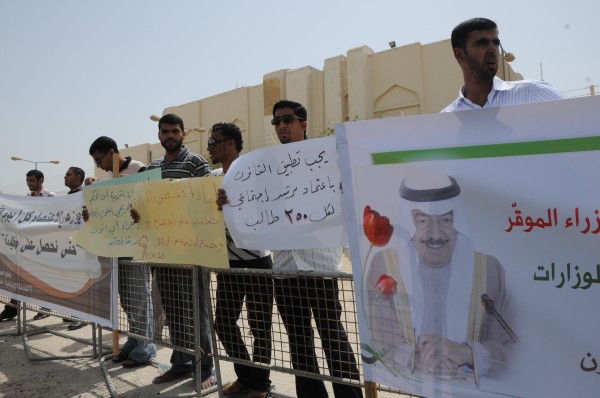Bahrain First, but Bahrainis Come in Third Place in their Country

2019-02-20 - 4:12 am
Bahrain Mirror (Exclusive): Since 11 years ago, the Bahraini Ministry of Education has been holding a major annual festival attended by King Hamad bin Isa Al Khalifa under the slogan "Bahrain first", but this event did not manage to shift the king and government's convictions, putting the Bahraini citizen first.
Statistics issued by the Labour Market Regulatory Authority (LMRA) indicate the extent of the marginalization of Bahrainis in the labor market and the loss of thousands of opportunities to foreign workers who have been favored by the government in the public sector on the one hand, and in Bahrain's private sector on the other hand. This is clearly shown by the numbers.
According to official statistics, Bahrainis are a minority in the labor market; they come third after Indian and Bengali nationals. The figures highlight the living difficulties that Bahrainis face in a country where oil has been discovered since the 1930s, and has all the resources for its citizens to have a well-off life similar to the lives of their neighbors in other Gulf States.
After the implementation of economic plans drawn up by the McKinseys Group, and other plans drawn up by the Government under the leadership of Khalifa bin Salman, it was shown that the livelihood has become difficult for Bahrainis, and that Bahraini citizens are not the priority in the island kingdom.
Opposition leader Ibrahim Sharif commented, via his Twitter account, on the statistics issued by the Labour Market Regulatory Authority, saying, "The numbers that have been repeated for more than a decade show that Bahrainis are a minority in their country, and that the Indian workforce is one and half more than Bahraini labor force, and that the Bengali workforce is equal to that of the Bahraini."
"The government is not concerned with this population imbalance, and the Parliament is unable to correct it, and most citizens are still spectators," Sharif added.
Bahraini tweeter Al-Alawi responded to Sharif by saying "the public sector rejects us, the private sector is not giving us a chance, and 90% of the [state] bodies are foreign," stressing that the Bahraini citizen studies and works hard but ends up unemployed! "This is the 2030 vision! The citizen is tired and exhausted".
Ghassan Khamis, from the Gulf Institute for Democracy and Human Rights, gave his opinion regarding the ongoing debate, highlighting that "the Bahraini government denies citizens access to jobs. Consequently, it will be impossible for the citizen to get married and have children." He goes on to say that at the same time, "it imports large alarming numbers of foreigners, granting them citizenships, jobs, and houses, thus preparing them for reproduction. This is a process of direct ethnic cleansing of the Bahraini indigenous people."
Many Bahraini figures have talked about the authorities' favoring of foreigners, giving them employment opportunities while depriving Bahrainis of them, before the new statistics were issued. Lawyer Fatima Al-Hawaj wondered: "what is the aim behind dismissing Bahraini workforce and keeping foreigners? Making the Bahraini families starve while pampering foreigners will not benefit you [the government] internationally."
Former assistant secretary-General of General Federation of Workers Trade Unions in Bahrain, Sayed Hashem Al-Mousawi, said that "the number of Bahraini employees in the labour market indices has not changed since 2015, which means that a large number of graduates are unemployed."
"In the last census of the Bahraini population, it was shown that 800,000 foreigners reside in the Kingdom of Bahrain, and the majority of them work in jobs that enable them to live in this country, while the Bahraini's wait for a job is just as his wait for a housing unit," said head of Parliament's services committee Ammar Sami Qambar.
Another Twitter used, Maestro, believes that "the government does not want to employ Bahrainis unless they are new Bahrainis [naturalized]. If the government wanted to employ Bahrainis, the sons of this country, it would have easily made regulations, and there are models of this in neighboring countries."
The rate of Bahraini workforce in the labor market has declined dramatically in recent years. A report released in the last quarter of 2015 by the Bahrain Labour Market Regulatory Authority revealed a 22% decrease in the Bahraini workforce. Despite warnings and appeals, the policy of favoring foreigners, naturalizing them and giving them priority continues, until the livelihood of Bahrainis, which has become an open line that everyone could cross over.
- 2024-05-08Bahrain: One Step Forward, Two Steps Back
- 2024-05-06Ali Haji May Face Imprisonment Again on Charges of "Penetrating a Restricted Area"
- 2024-05-01Was the Resumption of Flights with Iraq Expected?
- 2024-04-20Recent Releases in Bahrain: Something Has Changed
- 2024-04-04Return of Repression to Bahrain's Streets with the Crown Prince and Prime Minister's Blessing